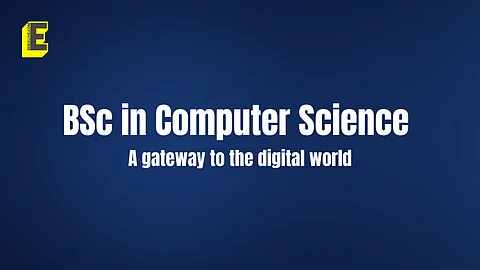

In today's rapidly evolving digital landscape, a degree in Computer Science opens doors to countless opportunities across industries.
Whether you're just starting your academic journey or looking to enhance your existing qualifications, understanding the full spectrum of options available can help you chart a successful career path in technology. So here is your guide to getting into the digital world.
BSc Computer Science entry requirements
To pursue a BSc in Computer Science in India, you need to meet specific eligibility criteria. The educational qualification required is completion of 10+2 (Higher Secondary) with a pass in all subjects and a background in science, typically including subjects like Mathematics, Physics, and Chemistry.
Enhancing your degree with certificate courses
While your degree forms the foundation, certificate courses can provide specialised skills and improve employability in the competitive job market.
· Programming and development
Programming skills are essential in computer science. Languages like Python, Java, C++, and JavaScript offer versatility across platforms. Web development skills, including HTML, CSS, React, and Angular, are increasingly valuable as businesses expand their online presence. For those interested in mobile technologies, courses in Android and iOS development can open doors to careers in application development.
· Data and analytics
In today's data-centric world, expertise in data science, including machine learning and deep learning, is highly sought after. Knowledge of databases such as SQL and MongoDB ensures you can effectively manage and manipulate data that powers modern applications.
· Cybersecurity and networking
As digital security concerns grow, courses in network security and ethical hacking provide practical skills for protecting systems. Industry certifications like CompTIA Security+ validate your expertise and demonstrate your commitment to maintaining secure environments.
· Cloud computing
Cloud platforms have transformed how businesses operate. Certifications in AWS, Microsoft Azure, and Google Cloud prepare you for roles in cloud architecture and management, skills that are increasingly valuable as organisations migrate their infrastructure to cloud-based solutions.
· UI/UX design
User experience has become crucial for digital products. Learning design tools like Figma and Adobe XD allows you to create intuitive interfaces that enhance product usability and satisfaction.
Where to find quality courses
Several online platforms offer excellent courses to develop your skills:
· Coursera offers professional certificates in various domains, including AI, cybersecurity, and UX design, with programs developed in partnership with industry leaders.
· edX provides courses from top universities globally, allowing you to learn from renowned institutions regardless of location.
· Class Central aggregates free online courses from prestigious institutions like Harvard, Stanford, and MIT, making quality education accessible to everyone.
· University of the People focuses on computer science certificate programs that develop professional skills directly applicable in the workplace.
Advanced degree pathways
After completing your BSc Computer Science or BCA, several higher education options can help specialise your expertise:
· A Master of Science (MSc) in Computer Science focuses on advanced theoretical and practical aspects of computing, preparing you for specialised technical positions.
· The Master of Computer Applications (MCA) emphasises application development and software engineering practices, ideal for those who want to excel in creating robust software solutions.
· An MBA with specialisations in Information Technology or Systems Management combines technical knowledge with business acumen, preparing you for leadership roles.
· A Master in Computer Management (MCM) blends computer science principles with management theories, creating a unique skill set for professionals who want to lead technical teams.
· The Master of Information Systems (MIS) focuses specifically on integrating information technology with business processes to optimise organisational effectiveness.
International immersion programmes
Gaining international exposure can significantly enhance your educational profile:
· Deakin University in Australia offers semester-long programs specialising in cybersecurity and cloud computing, providing hands-on experience with cutting-edge technologies.
· The ISA Study Abroad program in Stirling, Scotland provides opportunities to study in a diverse international environment, enhancing your global perspective.
· TEAN - University of Auckland in New Zealand provides comprehensive computer science courses in a cosmopolitan setting, exposing students to diverse approaches to technology challenges.
Employment opportunities
A Computer Science degree opens doors to numerous rewarding careers:
· Software developers design, develop, and test software applications that solve real-world problems. They work with various programming languages and frameworks to create functional, efficient software solutions.
· Data scientists analyse large datasets to extract insights and patterns, helping organisations make data-driven decisions through statistical methods and machine learning algorithms.
· Web developers build and maintain websites and web applications, ensuring they are visually appealing, functional, and secure across different devices and browsers.
· Database administrators manage and organise data using specialised software, ensuring information is secure, accurate, and accessible to authorised users when needed.
· System analysts analyse and design technology solutions to meet business needs, acting as a bridge between technical capabilities and organisational requirements.
· IT consultants provide expert advice to organisations on how to use IT effectively to meet business objectives, recommending solutions that align with strategic goals.
· Network engineers design and implement computer networks that enable seamless communication and data exchange within organisations and beyond.
· Cybersecurity analysts protect systems and networks from cyber threats, implementing security measures and responding to incidents to safeguard sensitive information.
The field of Computer Science continues to evolve rapidly, creating new specialisations and opportunities. By building a strong foundation through your degree and strategically enhancing your skills with certificates, advanced studies, and international experience, you'll be well-positioned to thrive in this dynamic industry that requires continuous adaptability in order to reap the benefits of its excellent growth potential and a rewarding career in the digital realm.
Apart from BSc Computer Science, related programmes, BCA and BSc Data Science.
